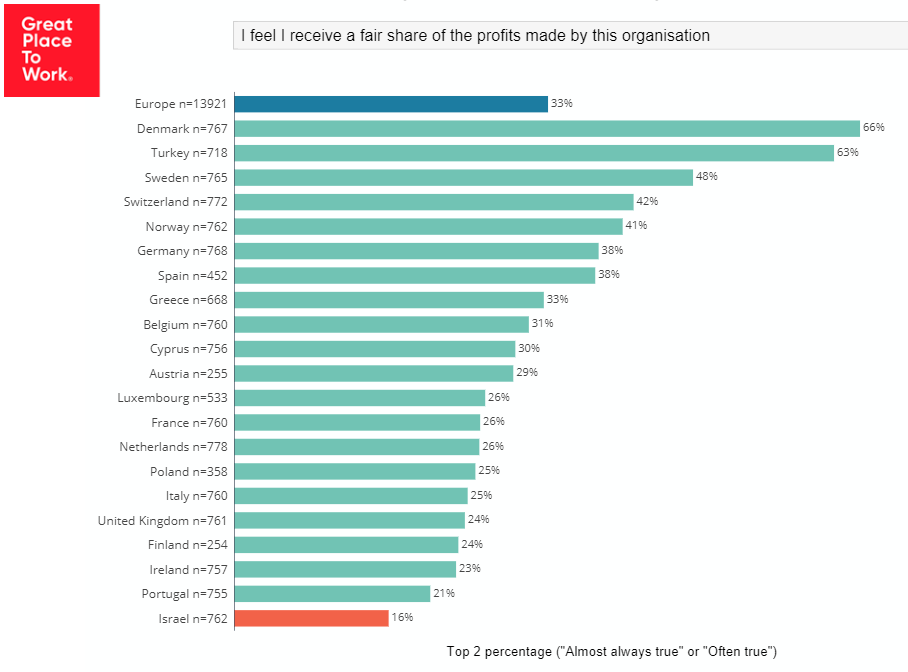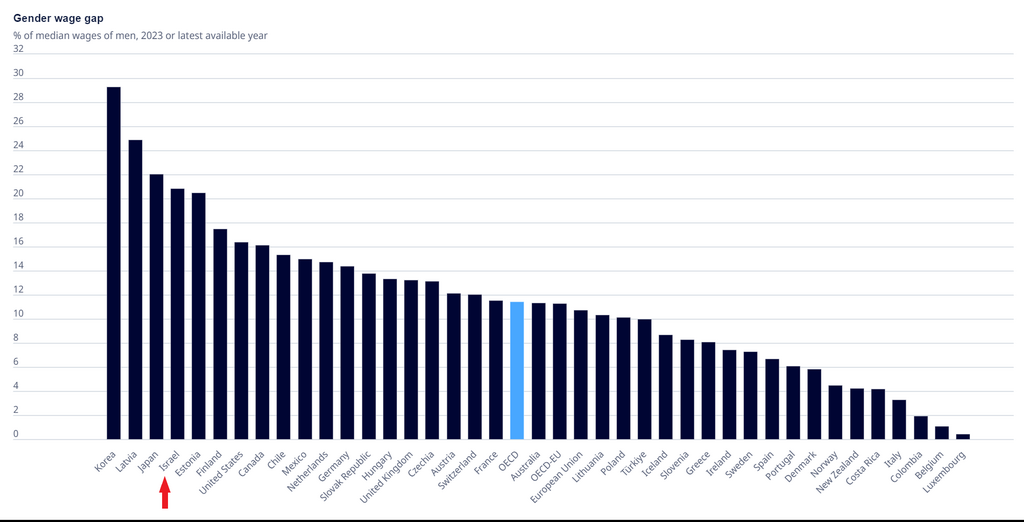
The smart way to improve employee fair pay perceptions
From extreme transparency through to founding an academy and offering professional training. Employees in Israel feel their wages are too low compared to Europe, where employees are more satisfied with their paychecks. Where does this come from? What can you do to improve how your employees feel, and their recognition of employer's efforts to reward them - without increasing salary expenses?
Do you feel you’re being paid a fair wage? If the answer’s no, you’re not alone. A new Great Place to Work study, polling 30 thousand employees across 21 European countries, including a sample of 1,500 employees in Israel, shows cause for concern. Only 37% of workers in Israel, compared to 45% in Europe think they receive a fair wage.
The gap widens when it comes to women. Only 33% of women working in Israel feel they’re paid fairly, compared to 42% of women in Europe. “The figures are worrying, but not surprising” says Jonathan Pietra, owner of Great Place to Work Israel. “There are several factors affecting fair pay perceptions in Israel. Some external, some internal.”
Pietra explains that external factors, over which the employer has no control, such as the high cost of living, lack of economic stability or unforeseen events such as wars or periods of unemployment, contribute to a sense of economic insecurity that directly affects fair pay perception. He adds, “When employees experience frequent economic upheavals, it affects how they feel about the value of their work.”
Whole Foods provides extreme transparency of everyone’s wages
Despite these external factors, there are lots of things companies can do to improve how their employees feel - without increasing their budget. Transparency is one tool used by some companies to address this. Not verbal transparency, but rather extreme transparency regarding wages. “Everyone knows exactly how much the worker next to them receives and why” explains Pietra.
“Companies such as Whole Foods or the Buffer software company, demonstrate complete transparency when it comes to wages, including that of the CEO.” He explains, “At these companies, every employee can see the full wages charts, including detailed criteria for determining wages such as experience, seniority, performance and market demands. It helps employees understand how wages are determined and why wages vary between employees. When it’s all on the table, it's easier to deal with the sense of unfairness.”
It seems like it’s not just about the money. Pietra explains that work-life balance also plays a decisive role in fair pay perceptions. “The greater balance the employee feels between work and family life, the higher their fair pay perception” he explains. “This may be expressed through working hours flexibility, the option of working from home, or support for employees’ personal needs. Being able to take a child to the doctor without feeling guilty is worth more than a bit more money.”
Every penny counts. Minimal profit sharing makes all the difference
The study also addresses profit sharing. “Israel received the lowest score in Europe in terms of profit sharing” says Pietra. “Only 20% of employees in Israel feel they share in the company’s profits, compared to 35% in Europe.”
5 View gallery


Results of an employee survey based on Great Place To Work's trust index
(courtesy: Great Place To Work)
He says that the solution needn’t be complex or costly. “Even sharing one thousandth of company profits each year can make employees feel they’re part of the success.” He says that some public companies such as Unilever offer their employees the option of purchasing company shares at a subsidized rate.
This is a great practice. It’s interesting that employees feel like they own the company and that they’re part of its success, even if they’re only receiving a small share. The sense of belonging makes the difference and improves their fair pay perception.”
His further suggestion, that won’t cost the employer money, concerns increasing awareness of existing benefits: “Issuing an annual summary of total renumeration employees received throughout the year can open up their eyes” says Pietra. “This includes provident funds, life insurance, meal subsidies, gifts and benefits. Employees are often not aware of the money accumulated in their pensions for example. When you present the whole picture, employees realize they’re getting more than they thought.”
Don’t waste money at the end of the year. Appreciate employee contribution
Pietra also stresses the importance of the connection of investing in employees and company success. “When you put on an annual event and bring in a performer and spend lots of money, it’s important to connect it to the organization’s successes and the employees’ contribution” he says. “Instead of just calling it an ‘end-of-year event’, you could say, ‘We’re celebrating our amazing achievements this year, made possible by you.’.”
Pietra suggests holding an “Excellence Ceremony”, naming employees who have contributed special value to projects and who have significantly contributed to the company. It gives employees the feeling that they’re part of the success and that their contribution is appreciated.”
The gender wage gap is a particularly painful issue in Israel. According to OECD data, as of 2023, only South Korea exceeds Israel in the gender wage gap. “In Israel, there are huge wage discrepancies between men and women, creating a sense of unfairness” says Pietra. He cites the example of Salesforce, that one sunny day decided to invest millions of dollars to correct these gaps once and for all. “It needn’t necessarily be expensive. You can start off checking and correcting small gaps. Appearing committed to the issue is what’s important.”
At Hilton hotels, even bartenders know their promotion prospects
Investing in employees’ personal and professional development is a further way to improve fair pay perception. Pietra explains that DHL founded an academy for its employees to study a wide range of course. “Employees can take courses in subjects such as law, economics, logistics and accountancy. This both enriches their knowledge and gives them the feeling that the company is invested in their long-term progress.”
Pietra continues, “Other companies offer coaching, mentoring or clear career tracks. The Hilton hotel chain, for example, offers each employee a structured career track from Day One. Even if an employee starts off as a barman on minimum wage, they know there’s a target and that the company is investing for them to get there. This very much affects fair pay perception.”
And finally, Pietra stresses the importance of training managers on the issue of wages. “It’s important for managers to be able to talk about the subject clearly and accurately” he says. “When a manager can explain the organization’s wage policy, how decisions are made, the parameters taken into account, it gives employees the feeling that the matter is being dealt with fairly and professionally, averting a great deal of frustration and misunderstanding.”
In conclusion, Pietra says, “Improving employee fair pay perception doesn’t have to entail spending more money. It’s a matter of organization culture, correct communication, and creating a sense of fairness and partnership. When employees feel appreciated and understand the full picture, they tend to be happier, even if their salary is unchanged.”
That said, he cautions, “These steps mustn’t be a substitute for fair wages. They must be part of an overall policy of appreciating employees and nurturing a positive work environment. At the end of the day, fair pay is the foundation for everything else. Combined with these practices, you can create a work environment where employees truly feel appreciated and properly rewarded.”
Great Place to Work is an international organization founded 30 years ago and operating across 170 countries that award global quality scores to exceptional workplaces based on methodology using 60 parameters. Best Workplaces flagship list is published annually in Fortune and People magazines. Over the last two decades, the companies that make up the list of the greatest places to work have experienced spikes in their share prices four times greater compared to the Russell 1000 Index, which includes the largest publicly traded corporations in the US, and also compared to comparable stock indices in other places around the world.
















